 Reporter: You are ranked number one and winner of two recent
Pro-Tour titles. Do you feel that you will surely win the Grand
Finals?
Reporter: You are ranked number one and winner of two recent
Pro-Tour titles. Do you feel that you will surely win the Grand
Finals?(This article appeared in the January
2003 issue of “Table Tennis World”, and was
written prior to the Pro-Tour Grand Finals in Sweden.)
 Reporter: You are ranked number one and winner of two recent
Pro-Tour titles. Do you feel that you will surely win the Grand
Finals?
Reporter: You are ranked number one and winner of two recent
Pro-Tour titles. Do you feel that you will surely win the Grand
Finals?
Ma Lin: No, you can’t play with
that much pressure. You would not be able to play your game if
you approach an event like that.
R: You were a big favorite to win the World Cup this year. Why were you stopped at the round of eight?
M: I just got back from playing two
Pro-Tour events in Europe, and I was not in top shape physically
or emotionally. I felt tired, and in an important tournament like
that, if you had not reached the right level of excitement and
did not have the strongest desire to win, you could not play the
best game you were capable of playing.
R: You played great in the following two Pro-Tour stops, in Poland and in Denmark, and you beat Boll and Schlager rather easily.
M: After the World Cup, I went back
to Beijing, and I had a week of adjustments. I also summarized my
difficulties and targeted those in my training.
R: Have you counted how many Pro-Tour events you have won this year? You lost twice to Chuan Chih-Yuan. Was he a difficult player for you?
M: I won 4 events. Chuan's style is
similar to a Chinese player’s. He played on our second team
for a long time, and he has good understandings of the Chinese
tactics and strategies. The first time I played him at Qatar, I
was up 3-1 in games and should have won. But I failed, probably
because I was too anxious. In Holland, I was not careful in
adapting to Chuan’s changes and variations.
R: You have been rising fast. How do you see your position on the Chinese team?
M: Several of us in the team are at
the same level. At any given time, there may be one player who is
best physically and mentally, and that player will have the best
results. We are also at the same level as some of the foreign
players.
R: Failing to make the Sydney Olympics was a great setback in your career. How do you look at that experience now?
M: I did not play all that well in
the tournaments leading to the Olympics, and failed to reach the
goals the coaches set for me. I was disappointed for not being
able to make the team. But now that I think back, I might not
have done all that well even if I went.
R: Since the new ITTF rules have been adopted, you have been a very consistent player. But you did not make the Asian Games MS roster. How did you feel?
M: There are only two spots
available. Against Asian opponents, such as Chuan, Matsushita,
and Oh, I did not have any relative advantages compared to my
teammates. The new service rule was just put in place, and we
were not sure about the effects on my game, so the coaches felt
that it was safer to pick Kong.
R: Some of the online fans say that whenever there is great difficulty Ma is always put in, but whenever there is controversy, Ma is dropped. They feel that your biggest opponents are your teammates. What do you think?
M: Table Tennis is an individual
sport, and we can’t send a lot of players out. When two
Chinese players meet in the finals, our teammate is our opponent.
My feeling is that first we have to defeat all the foreign
players, and that is the best way for us to establish our
position.
R: You and Kong have paired up since the China Open. You have played together for quite a while now, but your recent results are not great. What are the problems that the two of you face?
M: When Kong played with Liu
Guoliang, his position was straightforward and natural. Liu plays
pips-out and I play inverted, so I am a little further away from
the table. So there is a little bit of overlap in our positions.
Plus we are both right-handers, so we tend to run into each
other. We have to work on our footwork, and how to initiate the 3rd
ball attacks. We have not practiced much since the Asian Games.
If we could focus on our problems in the closed training
sessions, I think we will be fine.
R: Liu achieved great results for a penholder. You have further advanced the penholder skills, and now Wang Hao may be even closer to perfecting those skills. What do you think of Wang’s achievements?
M: Wang has a larger development space. He
plays the rallies better than the other penholders, and his 3rd-ball
game is better than the shakehanders’. He has combined the
advantages of the two styles. But he still has weaknesses. He is
a little weaker in defense, and he is a little slower in his 3rd-ball
attacks than the other penholders. The Europeans don’t know
how to play him yet. If he can execute with consistency, he will
reach great heights.
R: Many feel that you are a little conservative in competition and sometimes a little hesitant in key games. Those may be your biggest problems. How would you solve them?
M: I have realized this. In actual competition, there are many factors that affect your performance, so you can’t always play at the level you reach in training. There are many sources of pressure that will make you want to play safe. That is one of the reasons I don’t do as well in important events. In the last two Pro-Tour stops, Liu Guoliang and I have discussed this topic a lot, and I am now trying to work on this in a more proactive way. Even if my skills do not improve any more, I can still accomplish a lot by simply solving these problems.
(This article appeared in the January
2003 issue of "Table Tennis World". Liu’s
column is a regular feature of the magazine. In this column Liu
stresses that for Ma to win, he cannot be afraid of losing.)
At the end of 2002, I took our team to the Polish and Danish Opens. This was the first time I led a team on my own, and I feel that I have worked well with the players. When I was still playing, I had worked closely with them, and I used to help the coaches in preparing for tournaments. Now, only my title has changed.
Before the draws, I was hoping that Ma could meet Boll. Ma
himself wanted to play Boll, and he had felt confident at the
World Cup that he could beat Boll. But then regretfully Ma lost
to Primorac. If Ma could meet and beat Boll this time, he would
improve our confidence against Boll, and would also set Boll back
a bit. The draws were as we hoped for, and Ma met Boll in the two
stops.
Before they played, Ma and I discussed our
strategies. The main objective was to be proactive, and to
greatly vary the tactics. When Boll faced Kong and Wang Liqin, he
quickly seized the initiative and was clearly the more proactive
player. So Ma has to be aggressive, even if it meant trading off
safety. He needs to attack first, and let Boll follow his rhythm.
In the matches, Ma was clearly better with his 3rd-ball
attacks. Ma uses his head in competition, and he has good ability
in varying his tactics. But in the past he tended to be
conservative. On this trip, he overcame that problem. At the end,
he seemed like he was playing an effortless game, and could make
all the shots he wanted to make. When I was playing well, I also
got into that zone, where everything was right and my game was
the most natural and the most effective.
In the two stops, Ma made some breakthroughs, and there were
things to summarize and learn from. In the past he played better
in internal and in domestic competitions. In these two
tournaments he played well because he did not carry any mental
baggage. His level of performance was very close to his best in
training and in internal competitions.
In Poland, he did not start well. He fell
behind an unknown Czechoslovakian player 2-3, and finally came
back to win 4-3. After that match, I reminded him that he had to
pay attention to how he behaved on the court. When he was behind,
he should not look like he was in great pain. As a world
champion, you have to appear calm even if you were playing poorly
or awkwardly. You cannot display your feelings. The worst thing
for an athlete is to want to win but at the same time be afraid
of losing. The best thing is to want to win, and not be afraid of
losing. A player the caliber of Ma Lin should be extremely
confident and dominate the opponent in spirit. He should not be
playing every match so nervously.
When adjusting an athlete’s condition,
it is important to adjust the mental and the emotional aspects.
If you are rushed or impatient, you cannot perform well even if
you have superior skills. I talk to Ma off the court a lot, and
when I coach him on the court, I try to control his emotions.
After a match, I would use light words to help him relax. For
example, if he feels that he is playing awkwardly, I would
suggest that he changes to a more upbeat tempo. Actually Ma
sometimes appears happy too; after every game that he plays well,
he will come off the court smiling. If I were to show a stern
face, maybe he would not smile so much.
When I coach him, I stress the overall
picture instead of technical details. For example, in the first
game, I would ask him to be more aggressive in his 3rd
ball attacks and to control the pace. We would plan the first few
points of each game, and try to seize the initiative. When he can
do that, he will gain confidence and play with a smooth tempo. Ma
is better playing a fast pace than a slow one. In attacking and
rallying, he should adopt a fast pace. His analytical power and
his ability to vary tactics quickly are tops in the world, and
playing a slow game is not good for him.
For Ma, solving the mental problems is much
more crucial than solving the technical problems. If he can have
a better attitude, he will play even more effortlessly, and be a
more powerful player. Before the last two stops, Ma became the
number-1 ranked player. He wanted to play well to hold on to that
position longer. I fully understood this, and I told him that he
has to fight, instead of play safe. He has to have faith in his
ability.
In the past, Ma’s biggest problem is
being mentally conservative. When you try to play too rigidly,
you lose the creativity that is so important. He should adopt a
broader view. I told him that even if he were to lose, he was
still Ma Lin. People will not judge him on one match. Whether
he wins or loses, he has to believe that he is one of the best in
the world. I often tell him that to be a key player on our team,
and to be the best player in the world, he has to have guts. He
has to take on the toughest opponents, with the confidence that
he is the better player on the court. He should not worry about
losing a match; he should try to be a big winner in the sport.
Ma Lin has now reached a very high skill level, but he is not mentally strong. He would often play safe in the biggest matches, and not be able to play to his best ability. Ma is now aware of this weakness, and I believe that he will improve and mature.
(This article appeared in the March 2003
issue of Table Tennis World, which had Wang’s photo on its
cover.)
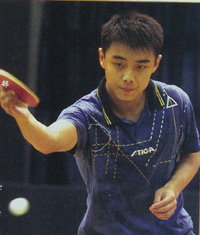 In the last
year Wang has emerged as a rising star. Both domestic and foreign
press has cast him as the next world-class Chinese player. In the
2002-12 ranking, Wang reached the 10th place, and in
the first Pro-Tour tournament of 2003, Wang captured the
men’s singles title for his 3rd Pro-Tour win.
In the last
year Wang has emerged as a rising star. Both domestic and foreign
press has cast him as the next world-class Chinese player. In the
2002-12 ranking, Wang reached the 10th place, and in
the first Pro-Tour tournament of 2003, Wang captured the
men’s singles title for his 3rd Pro-Tour win.
Ever since Wang joined the first national
team, he has been coached by Wu Jingping, who is a fatherly
figure for Wang. Wu manages all of Wang’s income and
expenses to make sure that Wang does not pick up bad personal
habits. As the media heaps praises on Wang, Wu minimizes the
number of interviews that Wang holds for reporters. He does not
want Wang to let success get to his head.
Before the Chinese New Year, our reporter went to the team to meet with Wu and Wang, and listen to what they say about some common issues.
Wang: I have chosen this style since
I was very young. I don’t know exactly why I did that, but I
think that I am well-suited to this style. When I first got in
the PLA team and the national team, they did not think very
highly of me, because I was playing a style that no one has tried
before. But I eliminated their doubts with my performances.
Wu: When Wang first joined our team, I did not think that he would do well. But he improved very rapidly. His style combines the advantages of the shakehand and the penholder styles, and yet it has uniqueness. It is a style with great potential. In the past, we have learned a lot from Ma Lin’s development, so we almost did not have any needless detour in Wang’s development.
Wang: There are so many excellent
players in the Chinese Super League. There is only one table in
play, and there are a lot of spectators. The excitement is just
as high as in the international open events. I have been playing
for the PLA/ICBC team since 1999. I played 6 matches in my first
year and only won one or two. That result has a big effect on me.
Ma Lin, Liu Guoliang and Wang Tao all helped me figure out why I
lost, and they shared their experiences with me. I learned a lot
from them, especially from Liu who is my model. His approaches to
the game and his personal attitude have shaped me. The training
was not as rigorous at the PLA team, but Liu always told me to
take it very seriously. He gave me much needed encouragement
after each loss. We had a strong team, and at its peak, Ma and
Liu almost never lost. I finally achieved a very good winning
percentage. In every season, we set our goals on winning the
league title.
Wu: Through the Super League competitions, Wang has made great strides. His team was one of the best. Liu has said half-jokingly that Wang comes from great heritage. Wang has benefited a lot from being on the same team as Liu, Ma and Wang Tao.
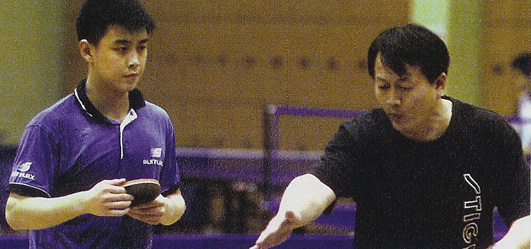 Wang:
On my first international trip, I played at the Polish and Danish
Opens in 2001. I lost to Rosskopf and a Swedish player,
respectively. At the 2002 Egyptian Open, I won my first Pro-Tour
title. From then on, I have confidence playing any foreign
player. Later I also won the Dutch Open. I feel that 2002 is my
year of ascent, and in my training I could always identify my
technical weaknesses and dealed with them. I have made some
breakthroughs. Although I still lack game experience, I have no
doubt that I will be one of the best.
Wang:
On my first international trip, I played at the Polish and Danish
Opens in 2001. I lost to Rosskopf and a Swedish player,
respectively. At the 2002 Egyptian Open, I won my first Pro-Tour
title. From then on, I have confidence playing any foreign
player. Later I also won the Dutch Open. I feel that 2002 is my
year of ascent, and in my training I could always identify my
technical weaknesses and dealed with them. I have made some
breakthroughs. Although I still lack game experience, I have no
doubt that I will be one of the best.
Wu: Wang has undoubtly done very well in the Pro-Tour tournaments, but not all the top players show up in these tournaments. There is luck involved. If he can reach the final 4 in every Pro-Tour, then we can say that he has passed the skill test. He is not quite there yet.
Wang: Compared to the best players,
my overall ability is still a little lacking. I also do not have
the experience, or the ability to fine-tune my mental state on
the court, so I think it is difficult for me to beat them in
major tournaments. But in the Pro-Tour Opens, I have faced
all of the top players, and it will not easy for them to beat me.
Although I have not played in the Worlds or the Olympics, I can
imagine the excitement and the pressure. After the new rules have
been effective, our team has entered a new development phase. The
Paris Worlds is imminent, and we are intensively preparing for
it. I am now looking forward to these top events. I hope that I
can test my ability through this type of competition. I look to
the future with great confidence.
Wu: Actually Wang is still only a minor threat at this point. He has not yet played in any world-class competition. From an ability standpoint, Wang is as good as any top player, but he lacks the big game experience. I think that Wang can win a title at the Paris World, but it may not be men’s singles. Perhaps he will be a pleasant surprise, like Ma Lin was at the 45th Worlds winning the mixed doubles. As long as Wang keeps training hard and improving, he has a good chance to make the 2004 Olympics team, although he would still be a new talent, and he will fight hard against every opponent. If he can stay level-headed, he has great potential, and will be one of the anchors of the team in the Beijing Olympics.
Birthdate: 1983/12/1
Birthplace: Changchun, Jilin province.
Club: PLA/ICBC
Height: 1.76m
Age when first started playing: 7
Style: Right handed fast-attack inverted penholder.
Blade: Yasaka
Forehand rubber: DHS-666
Backhand rubber: Butterfly
Career Highlights:
1999 World Club Champions
1999 Asian Youth Team Champions
2000-01: Super League Champions
2001: Men’s Teams Champions at the 9th National Games
2002: Egyptian Open and Dutch Open MS Champions
2003: Croatian Open MS
Champions
2003: Asian Championships MS champion
Below are some photos of Liu playing
shakehand, shown in the March 2003 issue of Table-Tennis World.
Liu's coach Yin Xiao said that Liu playing shakehand style can
beat all the women players on the national team. Liu recently
played a match against Qiu Yike, with Qiu giving Liu a 2-point
handicap in every one of the 11-point games. Liu won the
best-of-9 match.
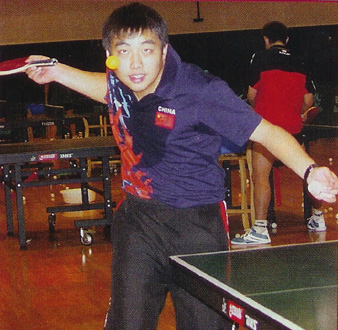
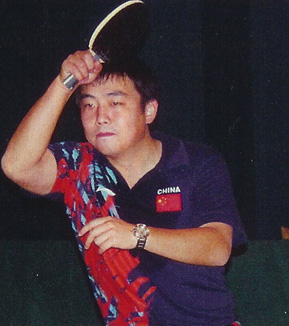
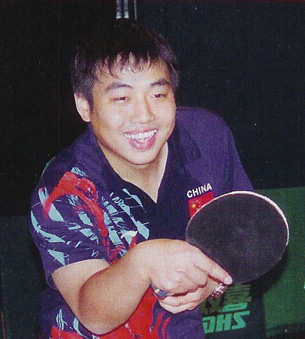
MS: Ma Lin, Wong Liqin, Kong Linghui, Wang Hao, Liu Guozheng, Qiu
Yike, Tang Peng
MD: Wang Liqin/Yan Sen, Kong Linghui/Wang Hao, Ma Lin/Qin Zhijian
WS: Zhang Yining, Wang Nan, Li Ju, Niu Jianfeng, Guo Yue, Li Nan,
Guo Yan
WD: Wang Nan/Zhang Yining, Li Ju/Li Jia, Niu Jianfeng/Guo Yue
MD: Qin Zhijian/Niu Jianfeng, Ma Lin/Wang Nan, Wang Liqin/Li Jia,
Yan Sen/Zhang Yining, Liu Guozheng/Bai Yang, Wang Hao/Li Nan, Hou
Yingchao/Fan Ying
Photo Link Here and Here.